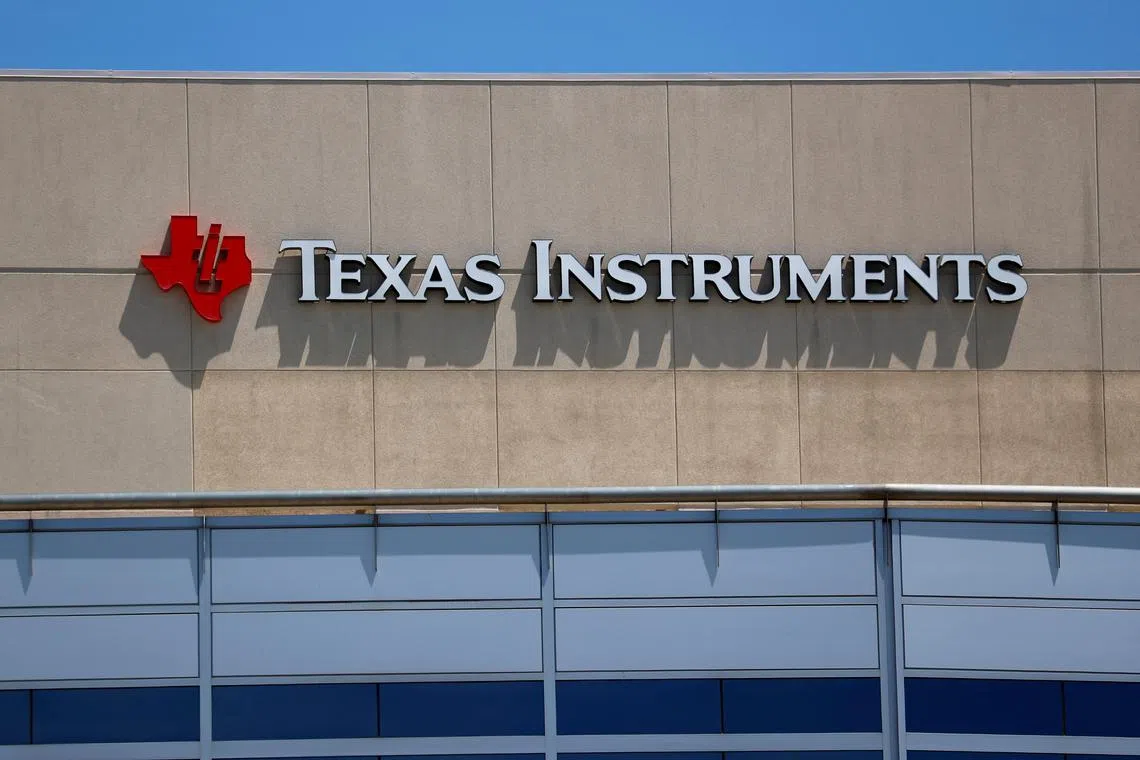Chipmaker Texas Instruments’ sales drop for first time since 2020
Sign up now: Get ST's newsletters delivered to your inbox

The outlook suggests that Texas Instruments may not bounce back quickly from its sales slowdown.
PHOTO: REUTERS
San Francisco – Texas Instruments, one of the world’s largest chipmakers, suffered its first sales decline since 2020 and gave a tepid forecast for the current quarter, after being hit by an industry slump.
Fourth-quarter earnings amounted to US$2.13 a share, it said on Tuesday, compared with a US$1.97 estimate. Revenue declined 3.4 per cent to US$4.67 billion (S$6.2 billion), breaking a run of double-digit percentage increases stretching back to 2020. Analysts had projected US$4.61 billion.
First-quarter revenue will be US$4.17 billion to US$4.53 billion; an average of analysts’ estimates was US$4.41 billion. Profit will be US$1.64 to US$1.90 a share, against analysts’ US$1.86 forecast.
The outlook suggests that Texas Instruments may not bounce back quickly from its sales slowdown. Wall Street expects revenue to decline throughout 2023 as the company’s customers focus on reducing their stockpiles of unused chips, rather than ordering new ones.
Texas Instruments has the longest list of customers and broadest range of products in the US$580 billion industry, making its projections an indicator of demand across the economy. It is also one of the first major technology companies to report results during the current quarterly earnings season.
The company is confident that long-term trends in electronics will increase the need for semiconductors, but is not offering any predictions on when orders and revenue might rebound.
“I wish I knew,” chief financial officer Rafael Lizardi said in an interview. “Customers have done what they’ve done for decades – and will continue to do – they’ve built a little too much inventory. We’ll see how long that takes to work itself out.”
Unlike some large technology companies, Texas Instruments has no plans to reduce its headcount to cut costs, he said, adding that the firm did not get ahead of itself and hire a lot of people during the past two years.
The sharpest sales declines
Companies such as Intel and Nvidia have reported steep drops in revenue as their customers cut purchases in an attempt to burn through unused stockpiles. Carmakers and producers of industrial systems – which struggled to get enough supply during the Covid-19 pandemic – have still been ordering at a healthy rate.
But analysts have speculated that it is only a matter of time before they start to cut back too.
“The industry has been undergoing a broader-based inventory correction starting late in the third quarter last year,” said KeyBanc Capital Markets analyst John Vinh. “On average, these corrections typically last four to five quarters, which would imply we bottom probably (around) mid-year.”
Texas Instruments is the largest maker of analogue and embedded processing chips, components that perform often simple but vital functions like registering button presses, detecting changes in temperature and controlling motors.
Such chips generally require less advanced production than Intel processors or other digital products. That focus has allowed Texas Instruments to become one of the most profitable companies in the industry and to devote its cash to dividends and share buybacks. BLOOMBERG


